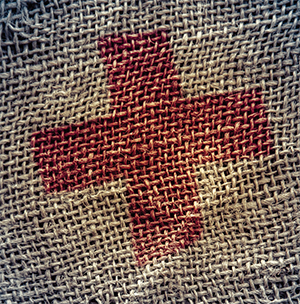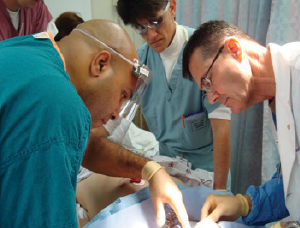
Mr Doomits/shutterstock.com
Richard Meehan, MD, can still hear the distinctive sound of footsteps that would travel along a gravel path toward his wooden hut in the middle of the night in Iraq.
“I’d hear somebody walk from the command post, either toward my hut or the operations officer who slept in the hut next to mine,” says Dr. Meehan, a rheumatologist and immunologist at the National Jewish Health Hospital (NJH) in Denver. “I hoped the footsteps would stop at his door, because that meant there was a logistic problem. If they stopped at my door, that meant someone was seriously injured.”
Dr. Meehan, age 67, is a retired Naval Reserve officer who served in two wars: the Gulf War—code named Operation Desert Storm—in 1991, and the Iraq War, or Second Persian Gulf War, in 2008. His memories of both wars are conflicted, filled with pride and pain, relief and sorrow. Still, he says nothing compares to his experiences in military medicine, remembering the lives he helped save and the brave service men and women who touched his soul.
Sense of Duty

Dr. Meehan, a Seabee Battalion Surgeon, conducts a community medical engagement near the Syrian border in 2008.
richard meehan, md (top & bottom);
Dr. Meehan signed up for the U.S. Navy Reserve in 1988 at age 39, joining a long list of family members with military service. He explains that the U.S. Navy generally does not recruit people who are 40 years of age or older unless they possess critically needed skills.
“It was an obligation,” he says, adding that his father and uncles had served during WWII. “I was healthy, able to do it, interested in military medicine and thought it would help me do a better job with my research at NASA involving environmental immunology.”
Dr. Meehan began working part time at the Johnson Space Center at NASA in Houston in 1984, where he also served as an assistant professor at the University of Texas at Galveston. For the next four years, he conducted immunology and physiology studies on astronauts, U.S. Air Force Academy cadets in prisoner of war training and U.S. Army soldiers in high-altitude training. He compared their blood samples before and after training or space missions and taught astronauts how to take their own retinal photos during their first few days of space flight.

During a Navy Trauma Training Course prior to deploying to Iraq, Dr. Meehan and a team of Navy Corpsman treated gang-related shooting victims at the USC emergency department.
Navy Corpsman Craig Meaders, HMC
